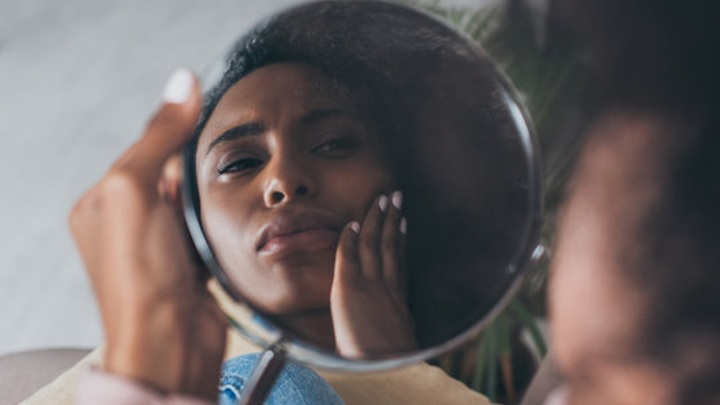Many people experience having their face darker than the rest of their body, especially on hot days. This is a common occurrence and is not harmful to your health. However, this can sometimes be bothersome and make you feel self-conscious.
There are several reasons why your face might be darker than your body, and it’s often a result of excessive sun exposure, hormones, and certain medications.
Read on to learn more about why your face might be darker than the rest of your body, how to fix this situation and what you can do to prevent it from happening again.
Why is my face darker than my body?
1. Excessive exposure to the sun
When you spend time in the sun, your skin produces more melanin, which is a pigment that gives skin its color. Melanin protects the skin from sun damage by absorbing ultraviolet (UV) radiation from the sun.
Over time, sun exposure can cause your face to get darker than your body because the face is more exposed to the sun than other parts of the body. It can also cause other problems, including premature aging and an increased risk of skin cancer.
2. Skin conditions
Several skin conditions can cause your face to get darker than the rest of your body. One of the most common is acne, a skin condition that causes the pores in the skin to become blocked, leading to the formation of pimples, blackheads, and whiteheads.
Other skin conditions that can cause the face to get darker include eczema, psoriasis, and rosacea. These conditions all cause inflammation of the skin, which can lead to darkening of the skin.
SEE: Can You Change Your Skin Color From Dark To Light?
3. Hormones
That’s right, hormones can cause your face to get darker. That is because when hormone levels are high, they can stimulate the production of melanin in the facial skin.
There are a few different things that can trigger hormones and cause the face to get darker. One of them is pregnancy. During pregnancy, hormone levels rise sharply, and this can cause the skin to darken.
Another common trigger is taking birth control pills. These pills contain synthetic forms of hormones, which can also lead to an increase in melanin production and darker skin.
So if you’ve noticed your face getting darker recently, it could be due to changes in your hormone levels. If you’re concerned about it, speak to your doctor or dermatologist for advice.
4. Cosmetic products
Most cosmetic products contain harmful chemicals such as lead, mercury, and arsenic. Exposure to these chemicals can lead to a host of health problems, including facial discoloration and cancer.
If you are using any cosmetic products that contain these chemicals, it is important to stop using them immediately and consult a healthcare professional.
5. Medications
Certain medications can cause hyperpigmentation in your facial skin because they contain melanin-producing ingredients. Some of these medications include antimalarial drugs, antibiotics, and antidepressants.
If you are taking any of these medications and notice your face getting darker, talk to your doctor.
6. Age
The skin on the face is thinner and less elastic than the skin on the rest of the body. As a result, it tends to get darker than the rest of the body as we age.
SEE: Here’s Everything You Need To Know About Uneven Skin Tone
7. Medical conditions
Several medical conditions can cause the face to get darker. One of the most common is Addison’s disease, which is a disorder of the adrenal glands.
Other conditions that can cause the face to get darker include Cushing’s syndrome, Acanthosis nigricans, and polycystic ovary syndrome (PCOS).
If you notice that your face is getting darker, it’s important to see your doctor to rule out any underlying medical conditions.
How to make your face the same color as your body
Skin lightening products
Skin-lightening products are available in different formulations, including creams, gels, lotions, and serums.
Some skin-lightening products contain hydroquinone, a powerful bleaching agent that can lighten your skin. Others contain ingredients like kojic acid, retinoids, and glycolic acid, which can also help lighten your skin.
If you’re interested in using skin-lightening products, it’s important to talk to your doctor about the best options for you. You should also ensure you follow the instructions on the product’s label carefully to avoid any potential side effects.
Photofacials
Photofacials use high-intensity pulsed light (HIPL) technology to decrease the production of melanin in hyperpigmented areas of the face. The result is a lighter facial skin tone, which may be enough of a difference to make your face look like the rest of your body.
Laser treatments
These treatments involve the use of lasers to remove unwanted pigmentation from the skin without damaging it. The lasers target the excess melanin in the skin and break it down, making your face appear lighter.
Chemical peels
Chemical peels are a skin-resurfacing procedure in which a chemical solution is applied to the skin to remove the top layer of dead skin cells. This process can help to lighten the face and even out discolorations.
SEE: How to Get a Flawless-Looking Skin Tone
Home remedies for facial skin lightening
There are many home remedies that you can use to lighten your face. Some of these include:
Lemon juice
Lemon juice is a natural bleaching agent and can be used to lighten your face. Simply apply fresh lemon juice to your face using a cotton ball and let it sit for 15 minutes before rinsing it off with water.
Yogurt
Yogurt is another effective home remedy for reducing excess pigmentation on the face. Mix 3 tablespoons fresh yogurt with 1 tablespoon honey and apply it all over your face. Leave the mixture on for 10-15 minutes before washing it off with a gentle cleanser.
Aloe vera
Aloe vera is also known to be effective in lightening the skin. Apply a mixture of 1 tablespoon of aloe vera gel and 1 teaspoon of brown sugar to your face using a cotton ball. Let it sit for 10-15 minutes before rinsing it off with water and applying your skin care product.
SEE: Home Remedies to Lighten Your Dark Knees and Elbows
How to prevent your face from getting dark
- Use sunscreen with SPF 30 or higher every day, even when it’s raining or cloudy.
- Wear hats and sunglasses when going outdoors during the day.
- Use natural or organic cosmetics, as they are much safer for your facial skin.
- Eat nutrient-rich foods such as fruits and vegetables.
- Avoid going outdoors during peak midday hours (i.e., between 10 am and 4 pm).
FAQs

Can sun exposure cause wrinkles?
Yes, it can.
The UV rays in the sun can damage the DNA in your skin cells, causing wrinkles and other signs of aging. To prevent this from happening, always use broad-spectrum sunscreen during the day.
Can alcohol make your skin look dull?
Yes, it can.
Alcohol can cause dehydration, which makes your skin look dull and lifeless. Alcohol can also worsen several skin conditions, including eczema and rosacea if you drink it too often.
Are laser treatments safe?
Yes, they are.
However, make sure to talk to your doctor about your medical history, as well as any medications you are taking before undergoing any type of laser treatment.
Conclusion
Sun exposure is the main cause of face darkening, but other factors, including hormones, age, and cosmetic products, can also play a role.
If your face is darker than your body, you can lighten it by using skin-lightening products or by undergoing laser treatments, chemical peels, or photo facials. You can also try to use home remedies such as lemon juice, aloe vera, and yogurt.
If you’re not sure of which one to go for, talk to your doctor or dermatologist about the best option for you.
Thanks for reading.
Visit Africana Fashion for more information on hyperpigmentation and other skin concerns.







